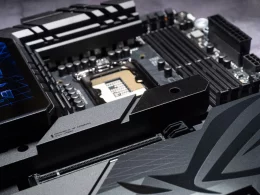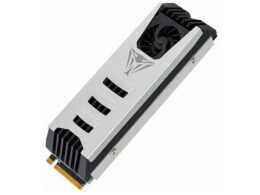Taiwan-based computer software and hardware corporation, TeamGroup, has introduced a new series of its T-Force GE PRO NVMe solid-state drives (SSDs), incorporating the latest PCIe 5.0 interface. The company claims that these drives will offer a remarkable data transfer speed of up to 14,000 MB/s, a feat made possible due to the usage of an advanced memory controller, and high-speed NAND flash memory chips.
Most of the existing and currently sold SSDs operating under the PCIe 5.0 standard are equipped with Phison’s flagship PS5026-E26 controllers. These controllers offer sequential read speeds of up to 12.4 GB/s and support NAND flash memory chips with a speed of 2000 MT/s per contact. However, TeamGroup’s T-Force GE PRO SSDs stand out with their inclusion of the state-of-the-art multi-core and energy-efficient memory controller InnoGrit IG5666, built using the 12-nm process. In addition to this, the advanced SSDs use high-speed NAND flash memory with a soaring speed of 2400 MT/s per channel. The new SSDs are also equipped with DRAM and SLC cache memory, enabling them to provide read speeds of up to a whopping 14,000 MB/s.
Technology utilized in the New SSDs
The drives come equipped with a thermal regulation technology that relies on temperature sensors and automatically adjusts the SSD’s performance to prevent overheating. Furthermore, the T-Force GE PRO SSDs support 4K LDPC (Low-Density Parity-Check codes) technology which ensures data transmission accuracy.
TeamGroup made a noteworthy mention that they developed a range of cooling systems for their PCIe 5.0 standard drives. These start from thin graphene sheets, air coolers with copper heat pipes and aluminium radiators, and extend to maintenance-free liquid cooling systems. It was also announced that the T-Force GE PRO PCIe 5.0 SSDs would be showcased at CES 2024, in collaboration with partner company, ASUS.
TeamGroup also indicated that pre-orders for the T-Force GE PRO PCIe 5.0 SSDs would be accessible from February 9 in both the US and Japan. However, there were no specifics shared about the volume options of the SSDs or their prices.





